J Color Grade Diamonds
Why J color diamonds can offer incredible value when buying a diamond
Why J color diamonds can offer incredible value when buying a diamond
The J color grade is the last of the ‘near colorless’ diamonds on the GIA color grade scale which ranges form G through J. While offering a hint of warmth, J color diamonds, can still look beautiful, especially when set in yellow metals. However, we tend to recommend them less frequently due to their noticeable tint, especially when compared to higher color grades. A 1-carat J color diamond typically starts around $4,082. J color diamonds might be a viable option, but it’s essential to consider the setting and overall aesthetic you desire.
Here’s what we’ll cover in this article:
What are J color diamonds?
How do J color diamonds compared to other colors?
How much do J color diamonds cost?
When to buy a J color diamond
Is it OK to put J color diamonds in pavé/halo settings?
FAQs
Why you should trust us
There are several things you’ll want to be aware of before you buy a diamond in this color grade. These include the diamond shape, the cut quality, and even the type of setting you choose for the diamond.
Below, we’ve explained everything you need to know about J color diamonds, from their color and general appearance to how they stack up next to better color grades, both in looks and in terms of value for money.
How are color grades determined? GIA, the worlds leading diamond certification laboratory, grades as such: “A chemically pure and structurally perfect diamond has no hue, like a drop of pure water, and consequently, a higher value. GIA’s D-to-Z diamond color-grading system measures the degree of colorlessness by comparing a stone under controlled lighting and precise viewing conditions to masterstones of established color value.”
J color diamonds fit into the “Near Colorless” range of the scale, meaning that while they may display some hints of color, they still appear primarily colorless when they’re looked at with the naked eye.
The J color grade is actually the lowest color grade that’s considered near colorless using the GIA’s diamond color scale.
To a certain extent, this has created a false perception that J color diamonds have an obvious, visible color that makes them less beautiful than diamonds in better color grades.
Because of this, a lot of consumers — often aided by jewelers wanting to sell more expensive diamonds — ignore J color diamonds in favor of G, H and I diamonds.
The reality is that a high quality, beautifully cut J color diamond can look absolutely stunning in an engagement ring or other jewelry, all while costing significantly less than an almost identical diamond with a better color grade.
With this said, there are a few downsides to J color diamonds that you’ll need to be aware of if you’re considering a diamond with this color grade. We’ve covered these further down the page, along with more information on the best ways to buy J color diamonds.
Pro Tip: Are you considering a J color diamond? J color diamonds can be a great choice in certain situations For example a diamond like this one from James Allen is stunning and will look perfect in certain engagement rings. Many people may gravitate towards a diamond like this from James Allen, and in certain setting types, you may have to. But if they are in certain settings, you would not be able to tell the difference and you will save $1,620 (a savings of more than 35%).
As we explained above, J color diamonds are the lowest color grade that’s still considered near colorless by the GIA.
By far the most common concern people have about J color diamonds is whether or not they’ll look colorless once they’re set in an engagement ring. Below, we’ve compared the color of a J color diamond (right) to a D color diamond (left, the highest color grade):
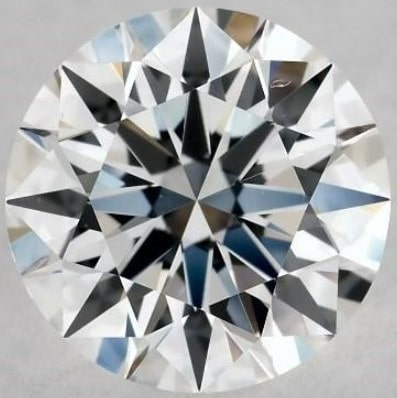
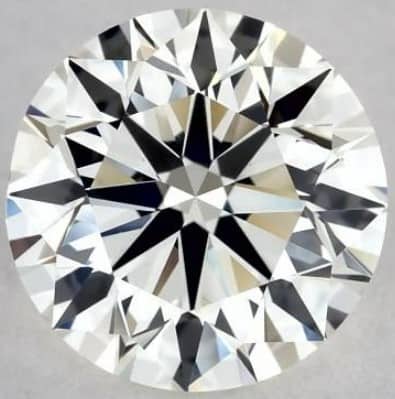
Both of these diamonds are from James Allen. Aside from their color, they’re identical in terms of quality — 1.00 carat, VS2, excellent cut round brilliant cut diamonds.
As you can see, the J color diamond looks slightly more yellow than the D color diamond — a difference that’s quite subtle but easy to notice when the diamonds are compared side by side under bright light and with magnification.
However, viewed with the naked eye away from bright lighting, it’s much harder to see the color difference between these two diamonds.
Despite this subtle difference, there’s a significant difference in price between the D color and J color diamonds. The D color diamond costs $6,070 on James Allen without a setting, while the J color diamond from James Allen is available for $3,020 — $3,050 less.
Part of the reason the color difference between these diamonds is quite subtle is the cut. Round brilliant diamonds have a cut that’s designed for optimal brilliance. Because they reflect so much light, they’re very good at concealing differences in color when viewed from above.
For example, take a look at the same two diamonds, this time viewed from the side rather than from above:
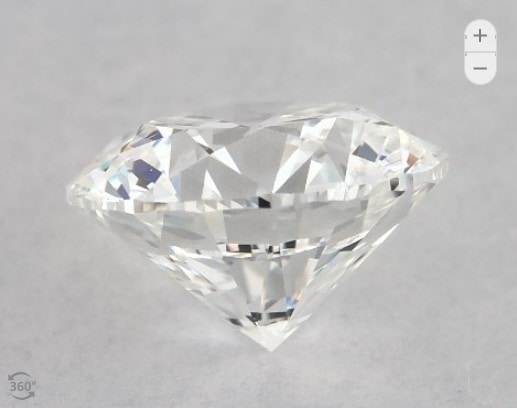
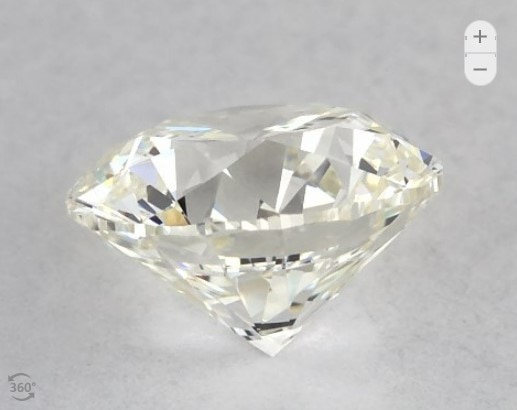
From this angle, the difference in color between the two diamonds is much more obvious and visible.
The difference in appearance between the J color grade and better color grade is also much more obvious with other diamond shapes, especially those that have a different facet pattern from the round brilliant cut.
For example, compare this 1.01 carat J color emerald diamond from James Allen (left) to this D color emerald diamond also from James Allen (right) of similar cut, clarity and carat weight:
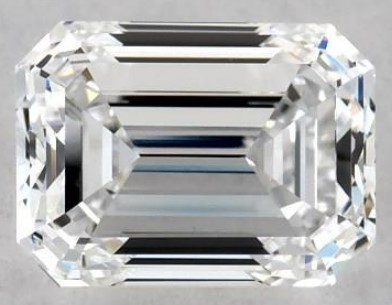
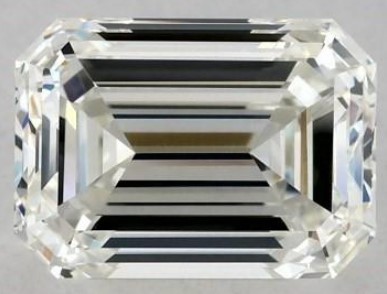
As you can see, the difference in color is a bit more obvious with this cut. Other shapes with a similar facet pattern to the emerald cut, such as the Asscher, cushion, radiant and princess cuts, may also display the slight yellow color of a J color diamond more than the round brilliant cut.
The color has a huge impact on the diamond price per carat, with diamonds in the colorless range (D color, E color and F color) significantly more expensive than diamonds in the near-colorless range.
The price difference between a D color diamond and a diamond of the same cut quality, clarity and carat weight with a J color grade is significant. For example, the D and J round brilliant cut diamonds we compared above had a price difference of $3,050.
As well as being significantly cheaper than colorless diamonds, J color diamonds can also be more affordable than other diamonds in the near-colorless range.
For example, this 1.00 carat, VS1 clarity, excellent cut, J color round brilliant cut diamond sells for $3,080 from James Allen. This G color diamond, also from James Allen, with identical cut quality, carat weight and color is priced at $4,990. That’s a $1,910 difference in price.
There’s also a reasonably significant difference in price between the J and I color grades, even though they’re only one grade apart. For example, this 1 carat I color princess cut diamond from Blue Nile is $3,330, while this J color diamond also from Blue Nile is almost 30% cheaper at $2,350.
As we mentioned above, the visible difference between the J grade and better color grades is more obvious in certain cuts than others.
It’s also more visible in certain settings and metals than others. For example, metals like rose and yellow gold will both pass some of their color into a diamond, making it look slightly more yellow than it really is, even if it has a flawless color grade.
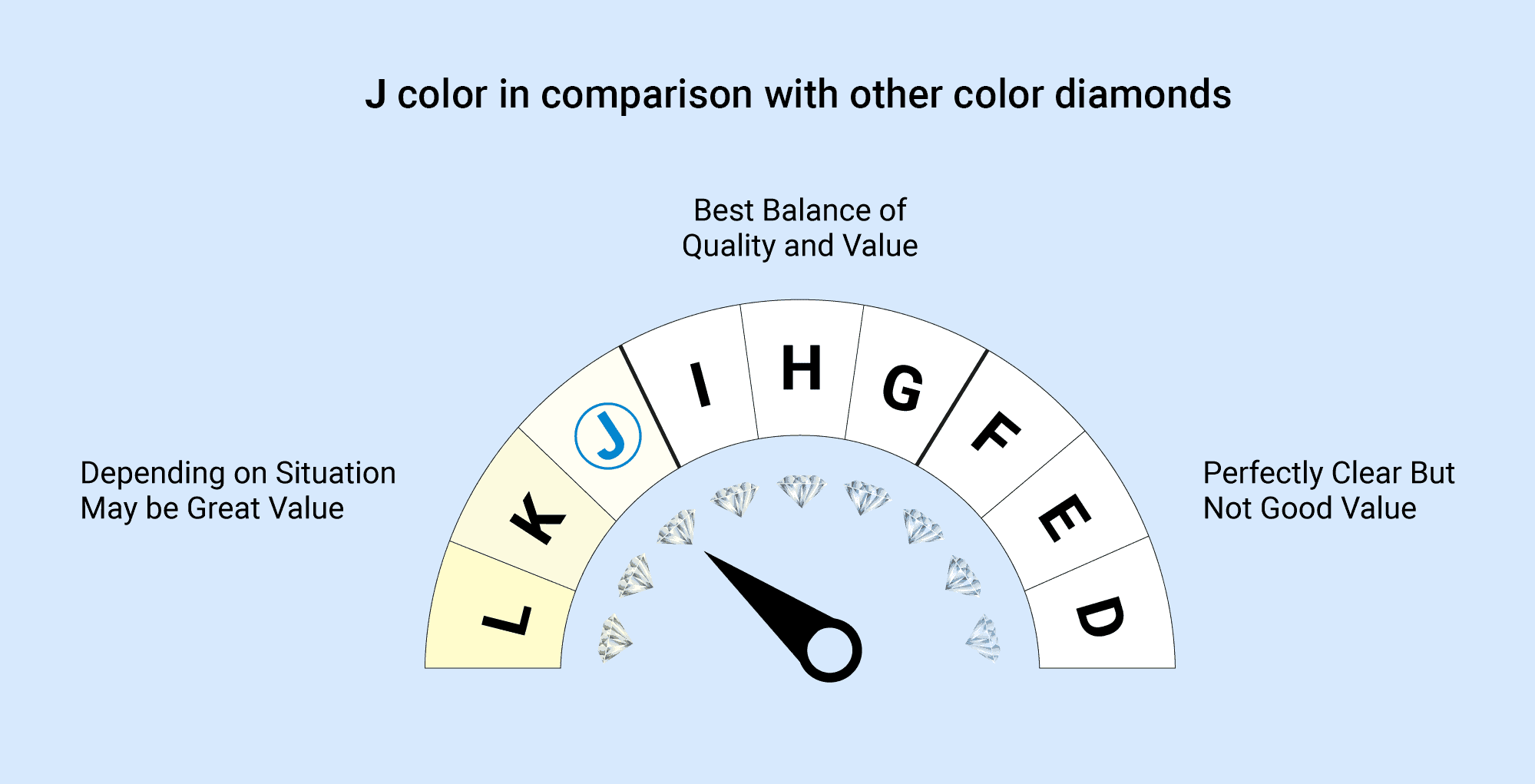
Because of the effect, these metals have on a diamond, picking a J color diamond for a yellow or rose gold setting is a smart buy. The difference in color is almost impossible to notice due to the strong hue of the metal, giving you more money to spend on cut quality or larger carat weight. Sometimes it’s even possible to go lower than J, to K color diamonds.
On the other hand, white-colored metals like platinum and white gold can make the slight yellow tint of a J color diamond more visible if you choose a diamond shape that emphasizes color.
This usually isn’t an issue with round brilliant cut diamonds (we actually recommend the J color grade for any solitaire settings), but it can be an issue with diamonds in other shapes, as we’ve explained below.
For round brilliant cut diamonds, we think the J color grade can be an excellent choice. While J color diamonds do have a very slight color, the round brilliant cut’s facet pattern and its ability to reflect light means you won’t notice this color once it’s set in a solitaire ring.
J color round brilliant cut diamonds can look great in all metals, including white metals like white gold and platinum. As we covered in our guide to the round cut, you can actually drop down to a K or L color grade for yellow gold solitaire rings, all without the color looking too obvious.
By choosing a J color diamond instead of a diamond with a better color grade, you’ll be able to set aside more of your budget for cut quality and carat weight — two factors that have a bigger impact on the diamond’s appearance.
While the J color grade can be a great value choice for round diamonds, it isn’t always a good choice for other diamond shapes.
Not all diamond shapes reflect light as well as the round brilliant cut, meaning they tend to show their color more obviously. This is particularly true for diamond shapes like the Asscher, emerald and princess cuts, all of which have a large table that makes their color quite visible.
For more of these shapes, you’ll generally want to stick with a color grade of I or better to avoid the stone looking too yellow (for some cuts, such as the marquise cut, a grade of H or better is recommended).
If you do choose a J color diamond in any of these cuts, we recommend avoiding white gold or platinum settings, both of which will make the slight yellow tint of the diamond more visible.
If you’re considering a diamond in any shape other than a round brilliant cut, check our diamond shape guide for specific recommendations. Each shape-specific guide lists our recommendations for diamond color grades that look the best, all while offering the best value.
Not sure which color and shape combination is best? Feel free to contact us to get personalized help from our diamond experts.
Beyond your choice of metal, the design of the setting you choose can also have an impact on how good a J color diamond looks. This isn’t an issue with a solitaire setting, although it can be something worth considering for settings that feature separate diamonds.
If you’re considering a halo, pavé or side stone setting for your J color diamond, it’s important to check that the diamonds used in the engagement ring setting are similar in color to your chosen center stone.
With three-stone and side stone settings, and particularly those with reasonably large side stone diamonds (that are certified), we recommend that side diamonds always either match the color of the center stone or are slightly darker.
This can often be difficult to do with a J color diamond, meaning you may want to choose a G color or similar near colorless diamond if you like this type of setting.
I color diamonds are higher than J on the diamond color scale. Technically, they’re “better”, with a less noticeable yellow tint. However, depending on the setting and diamond shape, J color diamonds may make a better purchase, as they can still appear colorless under the right conditions.
J color diamonds can be a very good purchase. For certain shapes, and in certain settings, they can appear colorless, and thus provide amazing value. You’ll want to go higher in color for settings or shapes that show color more clearly, though, such as shapes with a large table size and fewer facets.
J color is getting into the range where you will be able to notice a faint yellow tint with the naked eye, particularly under bright lights. However, this can be offset with the right setting (such as a solitaire setting) and shape (such as round brilliant), to the point where you don’t notice a J diamond’s color.
J color diamonds are not always bad. It depends on other factors of the diamond, and how these amplify or hide the faint yellow tint that J color diamonds have. If it’s not noticeable to the naked eye, J color diamonds can make a great value purchase.
J color diamonds can look absolutely stunning, provided they’re the right shape. If you’re looking for a round brilliant cut diamond for your solitaire setting, picking one with the J color grade allows you to save anywhere from hundreds to thousands of dollars, depending on the cut quality, clarity and carat weight.
This lets you allocate more of your budget towards a larger diamond or a diamond with a better quality cut — two factors that will affect its appearance more than its color.
If you need help buying a J color diamond or aren’t sure which color grade is best for you, contact us. Our experts can help you find the highest quality diamond for your tastes and budget.
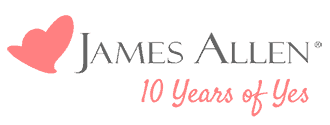



Before you buy a diamond, get personal buying advice from industry veterans. We'll help you get the best diamond for the money.
DISCLAIMER: We don't use your email for marketing. Period.
A diamonds’ price is determined primarily by the 4 Cs of the diamond. On the wholesale level, diamond prices are first based on a diamond shape and
Buying an engagement ring is often one of the first major purchases in a person's life. The process can be fraught with tension as there are so m
A wide range of 1 carat diamonds exist both in online markets and local diamond jewelry stores. Not only are there significant differences in beauty
Please enter your email address to receive your 25% off coupon code:
Here is your coupon code: GFDSF3GF